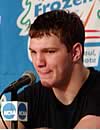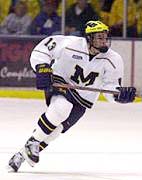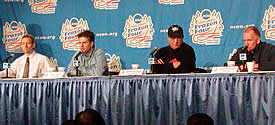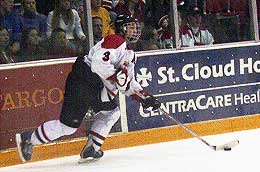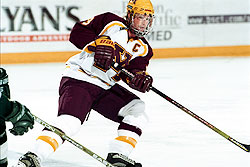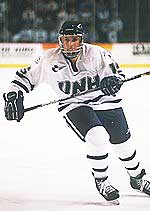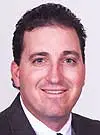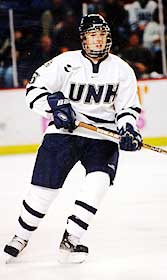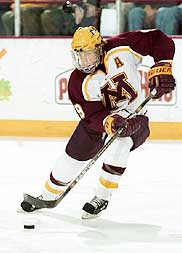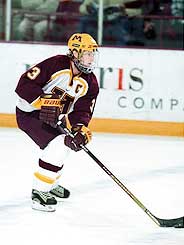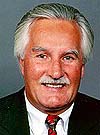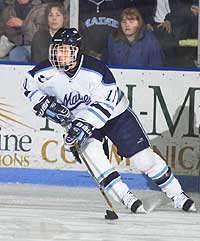Here’s a statistic that Hockey East loyalists are hearing for the umpteenth time, but Western fans should make note of: in Hockey East games, the Wildcats ranked first in team offense, team defense, power-play percentage and penalty-kill percentage. This led to finishing first in the league, winning the Hockey East tournament and gaining the top seed in the East Regional.
Not exactly underdog material.
Arguably, the Wildcats are the team to beat, although the minimal East-West matchups this year may lead those from Minnesota to make a strong case for the Golden Gophers as well.
Keeping first things first, however, UNH must get past the familiar Maine Black Bears before testing its mettle against the Best of the West. There is no crossover between the two regions until the title game, a situation unprecedented except for 1961 when Rensselaer and St. Lawrence met in one semifinal while Denver and Minnesota faced off in the other. (Denver then clobbered St. Lawrence, 12-2, to give the West its 12th championship in 14 years.)
Unlike this year’s title game where neither UNH nor Maine will have faced either Minnesota or Michigan, the Wildcats and Black Bears have each other on the hockey equivalent of a speed-dial.
“I don’t know if we’ll watch any tape; we’d probably get confused,” quipped UNH coach Dick Umile.
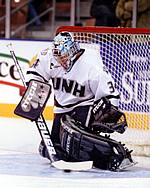
ayers
The two rivals faced each other three times during the regular season, splitting the series 1-1-1. However, Wildcat nation can justifiably apply an asterisk to the lone loss. One goaltender, Matt Carney, had been sidelined a few weeks earlier with a concussion and the other, Michael Ayers, suffered a severed tendon in his wrist midway through the game and had to be taken to a local hospital.
The tie game soon became a romp despite a creditable performance by third-stringer Tim Collins as a discombobulated UNH squad spent much of the third period in the penalty box. Would Maine have rallied anyway in front of its vocal fans? Maybe. Maybe not. No one will ever know for sure.
The two teams then went on to meet in the Hockey East championship game. The Wildcats broke open a third-period tie to take their first league crown, 3-1.
While head-to-head performances give the advantage to UNH, it’s not by a huge margin.
“There’s so much respect [between the two teams],” says Umile. “It’s going to come down to playing a 60-minute game.
“It’s going to be exciting hockey. You’re not going to see any traps. It’s going to be quick [skating], good transitional teams with, hopefully at least, a lot of up and down [action].
“UNH and Maine have had some terrific games. It’s going to come down to the wire.”
The big question going into this season was how well Carney and Ayers would be able to replace departed All-American Ty Conklin, who had left a huge void in the Wildcat crease. Carney, a senior, had recorded only seven decisions in his previous three years behind Conklin and Sean Matile. He had, however, played in the USHL during UNH’s run to the title game in 1999, preventing too much game-day rust from developing. Ayers, a sophomore, saw only mop-up duty last year.
When Ayers had a rocky debut, UNH fans might have been singing, “Where have you gone, Ty Conklin? Wildcat nation turns its lonely eyes to you. Woo-woo-woo.”
Instead, the two became a strong tandem, rotating after the early going and then playing tag team as first Ayers played exclusively during Carney’s recovery from a concussion and then Carney following Ayers’ surgery on his wrist tendon.
Ayers finished the season by setting a Hockey East record with a .938 save percentage in league games. (Carney came in at .920.) Ayers was also named second-team All-Hockey East.
“We’ve gotten consistent goaltending, which is really the reason why we’re in the position that we’re in,” says Umile.
The UNH coach has rotated the two down the stretch, except for injury, but has noted that once the season becomes single elimination, he may just go with the hot hand. It’s Ayers turn to go against Maine, but as has been the case in the postseason, Umile isn’t showing his cards.
In this writer’s opinion, Ayers is the better goaltender and should play against Maine and, if victorious, in the national championship game. However, Umile has a huge heart, especially for his seniors, and may find it difficult not to reward Carney for his three years of dues-paying.
Umile did go with Conklin, a sophomore, over Matile, a senior, in 1999, but in that case the gap between the two was significant. This year, the difference is a lot smaller, despite what worried UNH fans may think of Carney’s sub-par performance against Cornell.
“We think [Michael Ayers] is our most athletic [goaltender],” says Umile. “After a tough opening game at RPI, he quickly got it together. He’s had a phenomenal season. He’s been one of the top goalies in Hockey East. There’s no question that he’s going to be the goalie of the future.”
But is he the goalie of the present for the semifinal and potential championship game? Mums the word.
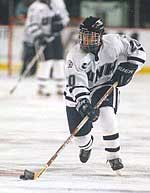
haydar
On the offensive side, the East regional game against Cornell showed just how difficult UNH is to shut down. Fourth-liner Jim Abbott, a regular point-man on the power play over the past couple years, scored two goals, including the game-winner. With four players totaling at least 40 points and nine having more than 20, there are just too many weapons.
Darren Haydar (31-45–76) centers the top line alongside Hockey East Rookie of the Year Sean Collins and sophomore Steve Saviano. The trio might be dubbed “The Smurfs” given that Collins ranks as the group’s enforcer at a generous 5-9 and 177 pounds.
Josh Prudden centers Colin Hemingway (33-33–66) and Lanny Gare on a second line that has been productive all year. But what makes UNH so dangerous is that the threats don’t stop there.
The third trio has been called by this writer “The Rose Between Two Thorns” since it places bone-crushers Pat Foley (6-1, 220) and Ed Caron (6-3, 215) alongside 5-10, 175-pound David Busch. Opponents can’t ignore Busch’s 12-19–31 scoring prowess, nor the ability of Foley and Caron to physically dominate games.
And when a 29-point player like Abbott can strike from the fourth line, it amounts to an embarrassment of riches.
“That’s been one of the [strengths] of our team,” says Umile. “If it’s not Haydar or Hemingway, we’ve been getting balanced scoring from everybody. You need it in the league we play in and if you get to this level, that’s how you got there.”
In the matchup against Maine, the special teams advantage goes decisively in UNH’s favor. The Black Bears’ Achilles’ heel this year has been the penalty kill, a factor the Wildcats have taken advantage of.
Ignoring the asterisk game in which Ayers was injured, UNH went 5-for-13 on the power play against Maine (5-for-15 if the extra contest is included). There was no big outbreak game to fatten the stats, but rather 2-for-6, 1-for-3 and 2-for-4. In other words, consistent strength.
At the other end, Maine went a comparatively paltry 2-for-10 on its power play against UNH, once again ignoring the asterisk game. Ignoring the Black Bears’ 4-for-11 performance in that penalty-filled contest, however, may not be completely appropriate.
“The teams are so evenly matched that specialty situations become important,” says Umile. “In the [Hockey East] semifinal game against Lowell, we didn’t have a power play, so you never know that you’re going to have one.
“We’re not doing anything different this year than we did last year [when our power play was only 11.8 percent]. We just have five better players who are a little older and the puck happens to be going in the net for us.
“Hopefully, if we do get a power play, we’ll generate some good opportunities. But I know in our situation with Maine, their power play has been absolutely tremendous. In the small rinks [as contrasted to our Olympic ice surface], it’s even more effective, so we’re going to have to pay a lot of attention to their power play.”
This year marks New Hampshire’s third trip to the Frozen Four in the past five years, but first since losing to Maine in overtime of the 1999 title game, 3-2. Only Carney remains from 1998 and UNH’s poor performance in the semifinals; Haydar and Busch are the lone holdovers from 1999.
Even so, there seems to be an institutional learning curve in the NCAAs that New Hampshire has mastered in recent years.
“When we lost to Michigan out in Boston [in 1998], we just didn’t show up,” says Umile. “I don’t know if we left it in the regional. I think we learned [from] that the following year when we got to Anaheim and played a great game and it was a bounce of the puck. We missed the opportunity to win it. Maine won it; we lost it.
“But we also learned that you’ve got to go out there, you’ve got to relax, and give yourself an opportunity to play your best possible game. You can’t go out there and be tense and worry. You’ve just got to go out there and play hockey.
“Haydar, Busch and Matt Carney are seniors that can bring that experience, share that experience and keep the guys really focused as to where we’re going. Don’t look too far ahead and take it game by game. That’s what they’ve done with this team throughout the season.”
As for the idea that there is extra pressure on UNH as the number one seed, Umile dismisses the thought.
“There’s no pressure,” he says. “The pressure is getting here. Once you get to the Frozen Four, anybody can win it. It’s very difficult to even get to our Hockey East playoffs at the FleetCenter, let alone get to the regionals. At this point, the pressure is off.
“Whether you’re [seeded] one, two, three or four, you’re in the Frozen Four and you have the opportunity to play a game to get to the national championship game that gives you a chance to win it.
“At this point, the guys are relaxed and they’re ready. We’ll just go out there and try to play our best game come Thursday afternoon.”
